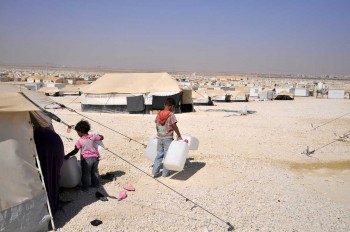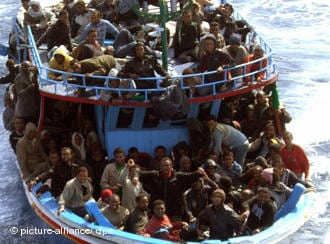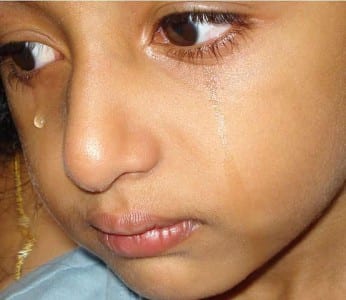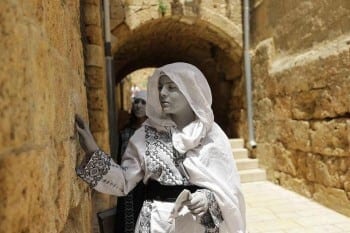Refugee crisis: the EU cracks down on volunteers
//
=By= Marienna Pope-Weidermann
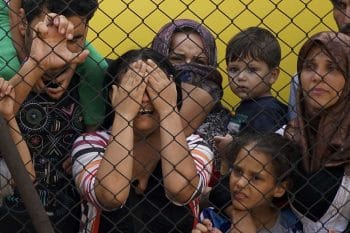
Syrian refugees at a train station in Budapest, Hungary. Mstyslav Chernov. (CC BY-SA 4.0)
[dropcap]I[/dropcap]n October 1943 Adolf Hitler ordered the deportation of all Jews in Denmark to Nazi concentration camps. More than 99 percent of them were saved because thousands of people risked imprisonment—and worse—to smuggle over 7,500 men, women and children to safety in Sweden in a matter of days.
Similar stakes may now be imposed on volunteers in the Greek islands, as the EU border agency, Frontex, begins to assert its authority over an area that 400 people have drowned trying to reach since the New Year. ‘We do feel as if we are in the resistance in World War Two,’ said Lara, a young Dutch volunteer on Chios. ‘We were “randomly” checked for papers and passports and told not to feed the hungry. Every move we make is being watched now.’
Frontex takes control
At the end of 2015 a storm was brewing. Slovenia, Croatia, Serbia and Macedonia shut their doors, trapping hundreds of people in freezing temperatures at Greece’s northern border. The move triggered hunger strikes and demonstrations, with young men sewing their lips shut to represent their voicelessness, wielding signs that read ‘Shoot Us or Save Us.’ Meanwhile, Greece came under growing pressure from the EU to control the flow of people and was threatened with exclusion from the Schengen free movement.
In response, Syriza has done all it knows how to do—surrender—and now the walls are closing in. With a bankrupt government leaving gaping holes in its aid system and an EU earmarking its wealth for border control, solidarity networks were given an informal go-ahead to do the lifesaving work that no one else was going to do. By working night and day they achieved superhuman feats and became the thin line separating disaster from total barbarism. But now, they are under attack.
2016 started with a move to force all volunteers and charities helping refugees in Greece to register with the police. This might not sound unreasonable, except for three important points. Firstly, a lot of the help people need—whether it’s giving lifts to get vulnerable people out of the cold or cooking for starving families without waiting for Greek bureaucracy to catch up with its paperwork—all this is against the law.
This is part of the reason why independent volunteers are so important. As Lara explained, big aid agencies ‘can’t even provide for the most basic needs because of the rules.’ She continued: ‘Part of what creates this inhumane situation is a lack of self-responsibility. As an independent volunteer with twenty blankets, you know if you don’t distribute them there will be at least 20 people freezing to death and that’s on your conscience. If you work for UNHCR and you have 200 blankets but are forbidden to give them out, the order comes from higher up so your conscience doesn’t come into it. Instead of questioning, they put the responsibility outside of themselves, which is comfortable and convenient.’
The second point is that over half the Greek police force support the neo-Nazi Golden Dawn Party, so volunteers are effectively flipping a coin as to whether they’re sharing sensitive information with an armed fascist. Thirdly, volunteers are now being refused registration left, right and centre. This is not just about elbowing out the political activists; even Clowns Without Borders failed to make the cut, and were denied access to Lesbos’ main refugee camp.
Clearly, when Frontex started throwing volunteers in jail a few weeks ago it was a sign of things to come. The first five—two Danes from Team Humanity and three Proem-Aid lifeguards—were locked up on smuggling charges after they rescued 51 people from a stranded dinghy the coastguard would not look for. ‘They treated us like terrorists,’ one of the Proem-Aid volunteers told the Spanish newspaper El País when they were released on bail for €5-10,000 per head. The custodial sentence is five to ten years.
The weeks that followed have seen a systematic militarisation of the refugee reception system and a move to insulate it from independent witnesses. In the north of the country, border police have been forcing refugees away from volunteer-run food and medical stations and out of heated tents into sub-freezing temperatures—a barbaric practice condemned by Amnesty International. Police have also been demanding fake bribes from refugees: €100 to cross the border. It’s stories like this that highlight the irony of police screening for ‘fake volunteers’ supposedly out to take advantage of vulnerable refugees.
On the island of Chios, where one volunteer was been arrested on espionage charges for photographing a Frontex boat, Greek solidarity workers report that ‘Frontex is now present everywhere.’
‘The deployment has begun without any information given to local politicians or the population,’ they write. ‘Frontex policemen sit together with their Greek colleagues in Greek police cars, permanently patrolling the beaches where refugees land. And they no longer allow fisher boats rented by volunteers to leave the harbour.’ Elsewhere, volunteers have had their accommodation stormed by riot police and have been submitted to full-body searches.
Even food deliveries are being restricted. Sheri Carr, a 21 year old volunteer recently returned to the UK, had tried to deliver sandwiches to three destitute families trapped in a camp because they couldn’t afford a ticket to Athens. She recalled a protracted argument with a UNHCR employee who would not let the food through due to a fear it would ‘bring in mice.’ ‘He told me not to worry, because they had all they needed: two packs of energy biscuits and a bottle of water a day.’ She paused. ‘That’s their food.’
On Lesbos, seven international volunteers were even arrested for ‘stealing’ discarded lifejackets. And a volunteer-run spotting station guiding boats at sea has been shut down by Frontex in collaboration with the Hellenic Police, who’ve also arrested and barred volunteers from Camp Moria, which the latter had diligently spent months improving.
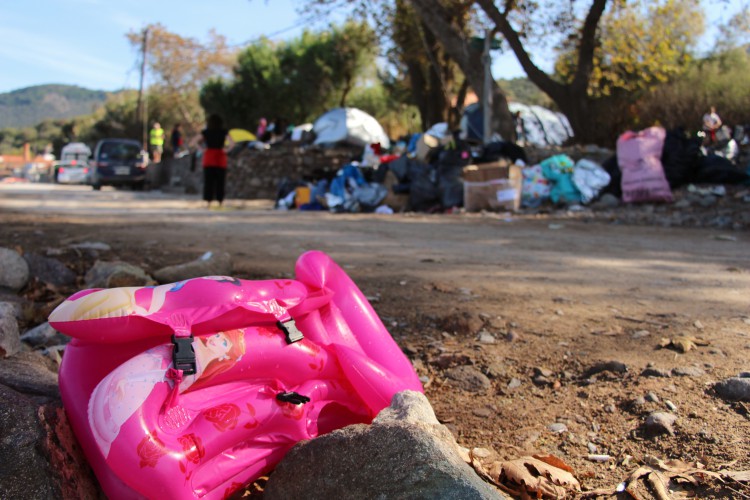
A refugee/volunteer transit camp on Platanos. Photo by Marienna Pope-Weidemann.
A coup by land, sea and air
But the crackdown on land is only half the story. A growing chorus of grassroots organisations condemn the deadly consequences of Frontex interfering with emergency volunteer rescue operations at sea. And as volunteer operations are curtailed they are not being replaced, reportedly leaving boats sinking at night, their passengers drowning quietly in the darkness.
According to numerous reports, refugees are no longer allowed to access self-organised coastal support services like those on Platanos, now threatened with demolition for building without a permit. The Platanos Refugee Solidarity group write that things have changed radically in recent weeks, as Frontex once more makes its presence felt: ‘Frontex vessels appeared and together with the Greek coastguard are barricading the sea the whole day. Very few refugees reach the shore [and so] no support from the frontline camps can be offered to these people, leading them to spend many hours without food, dry clothes and medical attention. Platanos sea rescue team was stopped several times from providing help or guidance to refugee boats and we were ordered to back away. In some cases the refugees had to wait for over an hour in the middle of the sea for the bigger Frontex ships to arrive and pick them up.’ Often, they are left waiting too long, or help never comes.
When survivors surface, it’s left—like everything else—to the volunteers to help reunite families and identify the dead. Even in this their efforts are increasingly frustrated. One volunteer describes how the formal family tracing service, ran by the Red Cross, requires forms to be printed, filled out in English and returned, which is impossible for many refugees in the camps.
‘We have more than 60 families we’ve helped submit paperwork and they get no reply,’ she told me. ‘We know they are building a database but it doesn’t seem to lead to any investigations. And we are ignored by Red Cross Athens, UNHCR, the police, the Hellenic Coastguard, everyone. And the system here is a mess. Back in the Autumn, they weren’t even trying to identify the bodies, just burying them in 24 hours in unmarked graves, or charging €6,000 for the bodies to be returned to family in Turkey! And no one is allowed to help us get information back to the families. “I want to help you but I need to think about my job”—that’s something we hear a lot from doctors in the hospitals.’
The crackdown on independent volunteers—by police repression or simply a bureaucratic system determined to freeze them out—has been ordered from the highest levels. The Council of the European Union is preparing plans to legally equate humanitarian assistance with smuggling and trafficking, thus criminalising those working to save lives and minimise suffering in the Aegean.
One lifeguard, on condition of anonymity and filled with shame, told me tearfully: ‘You can’t imagine what it’s like . . . to have a mother hold out her baby to you from a waterlogged boat, and to tell her that you can’t take the child into safety because you’ll go to prison.’
The gatekeepers
Now, the authorities are reaching out to strangle the airways. Flights for volunteers, scheduled by the humanitarian aid organisation Movement on the Ground, have been cancelled to allow authorities time to organise the registration process. As one volunteer whose flight was cancelled pointed out, the registration system means ‘there are a few NGOs on the island who will get total control.’
Presumably, these will be the ‘impartial’ NGOs that don’t concern themselves with the unsavoury political interests at play here, that won’t pass out blankets or beans when they’re not supposed to nor pass comment on the daily brutality of border controls and illegal pushbacks. The International Rescue Committee (IRC), for example, is one of the largest refugee agencies in the world. Active in over 40 countries, it gets funding from the US and UK governments and, according to the US historian Eric Thomas Chester, it has close ties to the CIA. Its overseers include prominent empire-builders like Henry Kissinger, Madeline Albright and Condoleezza Rice, and it is one of those ‘non-profit organisations’ whose CEO (none other than David Milliband) rakes in a cool £425,000 salary.
The IRC describes itself as ‘working closely’ with local volunteers. Although by its own admission it ‘does not have any special permission’ to operate on the island, sources on the ground report that it is playing a pivotal role enforcing the new registration system and clearing the beaches of independent volunteers.
Eric and Philippa Kempson have for years co-ordinated rescue and relief efforts from Eftalou beach and Eric has publicly complained about what he describes as the ‘bullying tactics’ of the IRC. ‘The IRC are kicking my volunteers off the beaches,’ he protested. ‘They’re in charge now, they say. This is the Americans taking over Lesbos in conjunction with the right-wing.’
Right-wing elements in the local community have been a persistent thorn in the side of the Kempson’s efforts, burning down their medical tent and pushing for local government to ban independent volunteers from the island and to forbid any aid work ‘within settled areas.’
Following the crackdown on volunteers was a blockade against the boats themselves. With NATO warships now deployed in the Aegean and returning stranded boats to Turkey—whose own attempts to stop boats reaching Greece appear increasingly violent—the flow of people has all but stopped. This is unlikely to be permanent, but may last long enough to drive out unregistered volunteers and militarise the islands under a new Frontex-led hotspot-detention system. It is a bid to re-establish government control of Europe’s borderlands, particularly Lesbos, an island which, at last, the world is watching.
But with fewer refugees crossing and fewer independent voices speaking out of what they endure, the world will turn away. Ultimately, booting independent volunteers off the island and pushing boats back to Turkey both serve to sweep the refugee crisis off European soil—and under a Turkish carpet. At the same time it re-directs donations back to the big agencies and destroys perhaps the most important achievement of independent volunteering: a network of whistle-blowers ready to scrutinise human rights abuses, who educate and humanise this crisis for people back home—the communities which vote in the governments of Fortress Europe.
But the crackdown is also politicising them. Confronted with the brutality of border control on one hand, and the tacit compliance of aid agencies on the other, they are looking elsewhere for answers. To quote 21-year-old James from Australia: ‘Seeing the agencies stand around, still waiting for the solution to yesterday’s problem to be approved, while a bunch of young people were working together, moving mountains with less funding… it’s what made me realise direct democracy can work.’
If they can bring that conviction and clear-sightedness back with them they will be powerful agents for political change at home. And ultimately, that’s what it will take to bring justice and humanity back to the frontlines: a moral revolution at Europe’s heart.
Note to Commenters
Due to severe hacking attacks in the recent past that brought our site down for up to 11 days with considerable loss of circulation, we exercise extreme caution in the comments we publish, as the comment box has been one of the main arteries to inject malicious code. Because of that comments may not appear immediately, but rest assured that if you are a legitimate commenter your opinion will be published within 24 hours. If your comment fails to appear, and you wish to reach us directly, send us a mail at: editor@greanvillepost.com
We apologize for this inconvenience.
 Nauseated by the
Nauseated by the
vile corporate media?
Had enough of their lies, escapism,
omissions and relentless manipulation?
Send a donation to
The Greanville Post–or
But be sure to support YOUR media.
If you don’t, who will?
